|
|
JIM LEHRER: Now our special emphasis on what the 2000 presidential
campaign should be about. We started asking individuals and groups that
question two weeks ago. We also invited our viewers to participate via
the Online NewsHour. Tom Bearden has our first report on that response
thus far.
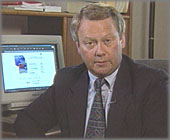 TOM
BEARDEN: We've received more than 2200 messages from all around the
country suggesting every conceivable issue to be addressed during the
2000 presidential campaign. Some of you simply listed issues you'd like
the candidates to address with little comment. June Fine of Boston suggested:
Campaign reform; renewable energy and regulating sport utility vehicles;
and health care reform for real. Charles Reed of Radnor, Pennsylvania
also suggested campaign finance reform and added income disparity, UN
obligations, environment preservation, and health care for the uninsured. TOM
BEARDEN: We've received more than 2200 messages from all around the
country suggesting every conceivable issue to be addressed during the
2000 presidential campaign. Some of you simply listed issues you'd like
the candidates to address with little comment. June Fine of Boston suggested:
Campaign reform; renewable energy and regulating sport utility vehicles;
and health care reform for real. Charles Reed of Radnor, Pennsylvania
also suggested campaign finance reform and added income disparity, UN
obligations, environment preservation, and health care for the uninsured.
And Rudy Werlink of Yorktown, Virginia said he wanted - "Specific
answers on how to protect the environment, including clean energy, improve
education for all, provide universal health care, fund medical research,
reform politics including 100 percent fair public financing for all
elections, limit corporate power and protect all children."
But most of you however chose to focus on one issue in particular.
We asked Scott Slocum of White Bear Lake, Minnesota to read what he
wrote.
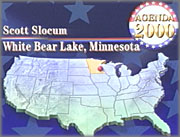 SCOTT
SLOCUM: I'd like to hear about the future of public information systems.
As corporate information systems develop, they will provide corporate
engineers, physicians, financiers, marketers and so on with strategic
information, specially processed and presented to help them compete
with other corporations and to help them market their products and services
to the American people. I'd like to see the American people provided
with public information systems of this quality, geared toward helping
us evaluate products and services, to direct public policy, to access
public works of art and educational resources and so on. I don't believe
that high quality systems of this kind will be funded by corporations--where
would the profit factor be? SCOTT
SLOCUM: I'd like to hear about the future of public information systems.
As corporate information systems develop, they will provide corporate
engineers, physicians, financiers, marketers and so on with strategic
information, specially processed and presented to help them compete
with other corporations and to help them market their products and services
to the American people. I'd like to see the American people provided
with public information systems of this quality, geared toward helping
us evaluate products and services, to direct public policy, to access
public works of art and educational resources and so on. I don't believe
that high quality systems of this kind will be funded by corporations--where
would the profit factor be?
TOM BEARDEN: Patrick Clark of Palm Harbor, Florida said he would ask
the candidates -- "What happened to tax reform? Now that there's
a surplus, should we forget all about it?" Joshua Parris from Atlanta
wrote - "I think the candidates should be focused on the future
Supreme Court appointments. With the current court often dividing 5-4,
it is important to me what litmus tests the candidates will be using
when determining their appointees." And David Fadness of San Jose,
California wrote -- "A major emphasis needs to be placed on domestic
infrastructure. We must restore crumbling facilities and begin building
new ones that will accommodate continuing economic development and improved
quality of life in our urban areas." And we received an e-mail
from 14-year old Susan Rankin from Bogue Chitto, Mississippi.
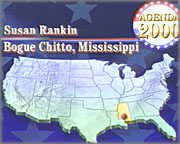 SUSAN
RANKIN: I am a freshman at Bogue Chitto Public High School. I think
a major topic in this upcoming presidential race is education. Bogue
Chitto is a school in a rural area. The curriculum is not at all what
you would call extended. Our languages consist of French and Spanish.
I am considered "forward" because I took French last year
in the eighth grade. The government should set up a plan or system that
would provide for rural schools. We should have just as much an opportunity
at higher education as those that to schools that have money." SUSAN
RANKIN: I am a freshman at Bogue Chitto Public High School. I think
a major topic in this upcoming presidential race is education. Bogue
Chitto is a school in a rural area. The curriculum is not at all what
you would call extended. Our languages consist of French and Spanish.
I am considered "forward" because I took French last year
in the eighth grade. The government should set up a plan or system that
would provide for rural schools. We should have just as much an opportunity
at higher education as those that to schools that have money."
|
|
|
TOM BEARDEN: Many of the e-mails we received questioned what America
would look like in the 21st century -- and urged the candidates deal
directly with the issues of race, overpopulation, immigration, and the
environment. We heard from Michael Jennings in Moscow, Idaho.
MICHAEL J. JENNINGS: I would like to see the candidates debate long-term
solutions for managing our biological resources in the face of urban,
suburban and exurban growth, as well as habitat losses from forest,
range and agricultural practices. While they have mostly been under
the purview of states, the now extensive manifestation of human development
is clearly a multistate and regional issue with a legitimate need for
federal involvement.
 TOM
BEARDEN: Steven Kolins of Pittsboro, North Carolina suggested -- "If
we were to rid ourselves of racism, the leap of civilization forward
would be as if we had cleared water from the gas tank." TOM
BEARDEN: Steven Kolins of Pittsboro, North Carolina suggested -- "If
we were to rid ourselves of racism, the leap of civilization forward
would be as if we had cleared water from the gas tank."
TOM BEARDEN: And Bernie Anderson of Middletown, Maryland wrote -- "I
believe this election should address the deep tribalization of our society.
A sense of common goals and purpose needs to be established. There are
too many people who don't believe they are part of the solution. This
is the alienation that isolates us from each other."
TOM BEARDEN: And we asked Jack Foss from San Francisco to read the e-mail he sent.
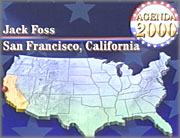 JACK
FOSS: The rapid demographic changes in the population and what this
means for the future is an issue that must be addressed by visionary
political leadership. Can a pluralistic society in which former majorities
are becoming minorities achieve a sense of unity and common purpose?
Can new citizens from societies in which there is no history of democratic
freedom identify with and preserve the ideals on which this nation was
founded? JACK
FOSS: The rapid demographic changes in the population and what this
means for the future is an issue that must be addressed by visionary
political leadership. Can a pluralistic society in which former majorities
are becoming minorities achieve a sense of unity and common purpose?
Can new citizens from societies in which there is no history of democratic
freedom identify with and preserve the ideals on which this nation was
founded?
TOM BEARDEN: Most of the e-mails dealing with immigration policy came
from one of the states most affected. Ian Roberts of San Francisco wrote
-- "I hope the candidates would discuss immigration. It has become
the issue that dare not speak its name. The present U.S. immigration
policy is run for the benefit of cheap labor interests, who donate large
amounts to buy both sides." And Girish Sajja of Concord, California
wrote -- "I am not sure how long the population can go on swelling
before the standard of living is going to drop-off or other problems
begin to rise."
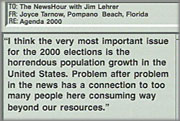 TOM
BEARDEN: From Pompano Beach, Florida, Joyce Tarnow wrote -- "I
think the very most important issue for the 2000 election is the horrendous
population growth in the United States. Problem after problem in the
news has a connection to too many people here consuming way beyond our
resources." Here's what Russ Agreen of Denton, Maryland added to
the debate -- TOM
BEARDEN: From Pompano Beach, Florida, Joyce Tarnow wrote -- "I
think the very most important issue for the 2000 election is the horrendous
population growth in the United States. Problem after problem in the
news has a connection to too many people here consuming way beyond our
resources." Here's what Russ Agreen of Denton, Maryland added to
the debate --
RUSS AGREEN: Overpopulation. One of your sponsors, Archer Daniels Midland,
casually advertises how they are going to help feed the 2 billion more
people expected in the next 20 years. All of the problems you will talk
about and many more are fueled by overpopulation, which is not just
a human phenomenon, but rather is as old as life itself. There is no
other solution to species perseverance, and problems for individuals
falls directly out of it; not just big ones, like warfare over territory,
but little ones, like aggressive driving or some of the feelings behind
youth violence. Look at the foundations of capitalism and free markets,
namely growth and competition. Growth is overpopulation and competition
is territory. Humans did not invent it. Until and unless we drink from
this cup of humility, we are doomed to putting band aids on problems
that have their roots deeply in the story of life on Earth, that of
overpopulation.
|
|
|
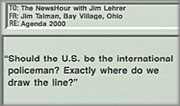 TOM
BEARDEN: We received dozens of e-mails suggesting the most important
responsibility for the President was establishing a clear direction
for the country in world affairs. From Jim Talman of Bay Village, Ohio
- "Should the U.S. be the international policeman? Exactly where
do we draw "line?" And we received an e-mail from Toni Dewey
of Boulder, Colorado - TOM
BEARDEN: We received dozens of e-mails suggesting the most important
responsibility for the President was establishing a clear direction
for the country in world affairs. From Jim Talman of Bay Village, Ohio
- "Should the U.S. be the international policeman? Exactly where
do we draw "line?" And we received an e-mail from Toni Dewey
of Boulder, Colorado -
TONI DEWEY: What is the real place of the U.S. in the world? How can
we pick and choose where to put our resources, energy and clout?
TOM BEARDEN: Here's what Bill McDonald of Stillwater, Minnesota had
to say --
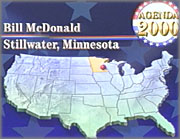 BILL
McDONALD: America is obsessed with itself, a tiny island of luxury in
a very troubled world. Are we going to try to run the world, as we seem
more and more inclined to do, and if so, how are we going to go about
it? If we are not, how are we going to keep it from running us. What
is our role to be? BILL
McDONALD: America is obsessed with itself, a tiny island of luxury in
a very troubled world. Are we going to try to run the world, as we seem
more and more inclined to do, and if so, how are we going to go about
it? If we are not, how are we going to keep it from running us. What
is our role to be?
TOM BEARDEN: Roger Bourke from La Cananda, California wrote -- "Our
relations with emerging nations must be normalized, particularly China
whose long-term economic potential is awesome. We cannot isolate or
demonize China successfully. We must engage and deal with her. How do
the candidates propose to do that?" Charles Daud of Salt Lake City
suggested -- 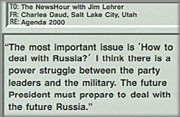 "The
most important issue is 'How to deal with Russia?' I think there is
a power struggle between the party leaders and the military. The future
President must prepare to deal with the future Russia." Issues
of value and responsibility were a common theme among many of the e-mails
we received. "The
most important issue is 'How to deal with Russia?' I think there is
a power struggle between the party leaders and the military. The future
President must prepare to deal with the future Russia." Issues
of value and responsibility were a common theme among many of the e-mails
we received.
Ignatius Giorgio from Brooklyn, New York wrote -- "The heart of
America's problem is that we have turned over too much responsibility
to the government. It is time for a candidate to step forward and tell
us we are accountable. This will take a person with guts but that is
the person who gets my vote. We have all lacked the fortitude to stand
by the principles that are called for to be truly great." And Craig
Schwenke of Herndon, Virginia added -- "Parents especially have
to be told to accept responsibility for their children, that it isn't
up to the schools to baby it them or to teach them morality or religion."
But this is what Albert Briggs, Jr., from Chestertown, Maryland had
to say.
ALBERT BRIGGS, JR.: I'm not interested in hearing any sermons on "values"
until the speaker has first told me who paid for his microphone and
why. I want to know what the donors expect to get and the candidates
expect to give in return for the large amounts of money changing hands,
because I know the candidates are as beholden to their contributors
as they are to the electorate.
TOM BEARDEN: In fact, campaign finance reform was one of the most popular
issues listed in many of the e-mails we received. Joan Bennett of St.
Paul, Minnesota wrote -- "This is a key issue because the current
campaign finance system has a profound impact on the ability of our
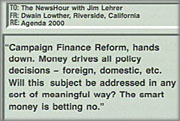 elected
officials to vote according to the wishes of their constituents."
And Dwain Lowther from Riverside, California said -- "Campaign
finance reform, hands down. Money drives all policy decisions - foreign,
domestic, et cetera. Will this subject be addressed in any sort of meaningful
way? The smart money is betting no." elected
officials to vote according to the wishes of their constituents."
And Dwain Lowther from Riverside, California said -- "Campaign
finance reform, hands down. Money drives all policy decisions - foreign,
domestic, et cetera. Will this subject be addressed in any sort of meaningful
way? The smart money is betting no."
|
|

 TOM
BEARDEN: We've received more than 2200 messages from all around the
country suggesting every conceivable issue to be addressed during the
2000 presidential campaign. Some of you simply listed issues you'd like
the candidates to address with little comment. June Fine of Boston suggested:
Campaign reform; renewable energy and regulating sport utility vehicles;
and health care reform for real. Charles Reed of Radnor, Pennsylvania
also suggested campaign finance reform and added income disparity, UN
obligations, environment preservation, and health care for the uninsured.
TOM
BEARDEN: We've received more than 2200 messages from all around the
country suggesting every conceivable issue to be addressed during the
2000 presidential campaign. Some of you simply listed issues you'd like
the candidates to address with little comment. June Fine of Boston suggested:
Campaign reform; renewable energy and regulating sport utility vehicles;
and health care reform for real. Charles Reed of Radnor, Pennsylvania
also suggested campaign finance reform and added income disparity, UN
obligations, environment preservation, and health care for the uninsured. SCOTT
SLOCUM: I'd like to hear about the future of public information systems.
As corporate information systems develop, they will provide corporate
engineers, physicians, financiers, marketers and so on with strategic
information, specially processed and presented to help them compete
with other corporations and to help them market their products and services
to the American people. I'd like to see the American people provided
with public information systems of this quality, geared toward helping
us evaluate products and services, to direct public policy, to access
public works of art and educational resources and so on. I don't believe
that high quality systems of this kind will be funded by corporations--where
would the profit factor be?
SCOTT
SLOCUM: I'd like to hear about the future of public information systems.
As corporate information systems develop, they will provide corporate
engineers, physicians, financiers, marketers and so on with strategic
information, specially processed and presented to help them compete
with other corporations and to help them market their products and services
to the American people. I'd like to see the American people provided
with public information systems of this quality, geared toward helping
us evaluate products and services, to direct public policy, to access
public works of art and educational resources and so on. I don't believe
that high quality systems of this kind will be funded by corporations--where
would the profit factor be? SUSAN
RANKIN: I am a freshman at Bogue Chitto Public High School. I think
a major topic in this upcoming presidential race is education. Bogue
Chitto is a school in a rural area. The curriculum is not at all what
you would call extended. Our languages consist of French and Spanish.
I am considered "forward" because I took French last year
in the eighth grade. The government should set up a plan or system that
would provide for rural schools. We should have just as much an opportunity
at higher education as those that to schools that have money."
SUSAN
RANKIN: I am a freshman at Bogue Chitto Public High School. I think
a major topic in this upcoming presidential race is education. Bogue
Chitto is a school in a rural area. The curriculum is not at all what
you would call extended. Our languages consist of French and Spanish.
I am considered "forward" because I took French last year
in the eighth grade. The government should set up a plan or system that
would provide for rural schools. We should have just as much an opportunity
at higher education as those that to schools that have money."
 TOM
BEARDEN: Steven Kolins of Pittsboro, North Carolina suggested -- "If
we were to rid ourselves of racism, the leap of civilization forward
would be as if we had cleared water from the gas tank."
TOM
BEARDEN: Steven Kolins of Pittsboro, North Carolina suggested -- "If
we were to rid ourselves of racism, the leap of civilization forward
would be as if we had cleared water from the gas tank." JACK
FOSS: The rapid demographic changes in the population and what this
means for the future is an issue that must be addressed by visionary
political leadership. Can a pluralistic society in which former majorities
are becoming minorities achieve a sense of unity and common purpose?
Can new citizens from societies in which there is no history of democratic
freedom identify with and preserve the ideals on which this nation was
founded?
JACK
FOSS: The rapid demographic changes in the population and what this
means for the future is an issue that must be addressed by visionary
political leadership. Can a pluralistic society in which former majorities
are becoming minorities achieve a sense of unity and common purpose?
Can new citizens from societies in which there is no history of democratic
freedom identify with and preserve the ideals on which this nation was
founded? TOM
BEARDEN: From Pompano Beach, Florida, Joyce Tarnow wrote -- "I
think the very most important issue for the 2000 election is the horrendous
population growth in the United States. Problem after problem in the
news has a connection to too many people here consuming way beyond our
resources." Here's what Russ Agreen of Denton, Maryland added to
the debate --
TOM
BEARDEN: From Pompano Beach, Florida, Joyce Tarnow wrote -- "I
think the very most important issue for the 2000 election is the horrendous
population growth in the United States. Problem after problem in the
news has a connection to too many people here consuming way beyond our
resources." Here's what Russ Agreen of Denton, Maryland added to
the debate -- TOM
BEARDEN: We received dozens of e-mails suggesting the most important
responsibility for the President was establishing a clear direction
for the country in world affairs. From Jim Talman of Bay Village, Ohio
- "Should the U.S. be the international policeman? Exactly where
do we draw "line?" And we received an e-mail from Toni Dewey
of Boulder, Colorado -
TOM
BEARDEN: We received dozens of e-mails suggesting the most important
responsibility for the President was establishing a clear direction
for the country in world affairs. From Jim Talman of Bay Village, Ohio
- "Should the U.S. be the international policeman? Exactly where
do we draw "line?" And we received an e-mail from Toni Dewey
of Boulder, Colorado -  BILL
McDONALD: America is obsessed with itself, a tiny island of luxury in
a very troubled world. Are we going to try to run the world, as we seem
more and more inclined to do, and if so, how are we going to go about
it? If we are not, how are we going to keep it from running us. What
is our role to be?
BILL
McDONALD: America is obsessed with itself, a tiny island of luxury in
a very troubled world. Are we going to try to run the world, as we seem
more and more inclined to do, and if so, how are we going to go about
it? If we are not, how are we going to keep it from running us. What
is our role to be? "The
most important issue is 'How to deal with Russia?' I think there is
a power struggle between the party leaders and the military. The future
President must prepare to deal with the future Russia." Issues
of value and responsibility were a common theme among many of the e-mails
we received.
"The
most important issue is 'How to deal with Russia?' I think there is
a power struggle between the party leaders and the military. The future
President must prepare to deal with the future Russia." Issues
of value and responsibility were a common theme among many of the e-mails
we received.  elected
officials to vote according to the wishes of their constituents."
And Dwain Lowther from Riverside, California said -- "Campaign
finance reform, hands down. Money drives all policy decisions - foreign,
domestic, et cetera. Will this subject be addressed in any sort of meaningful
way? The smart money is betting no."
elected
officials to vote according to the wishes of their constituents."
And Dwain Lowther from Riverside, California said -- "Campaign
finance reform, hands down. Money drives all policy decisions - foreign,
domestic, et cetera. Will this subject be addressed in any sort of meaningful
way? The smart money is betting no."